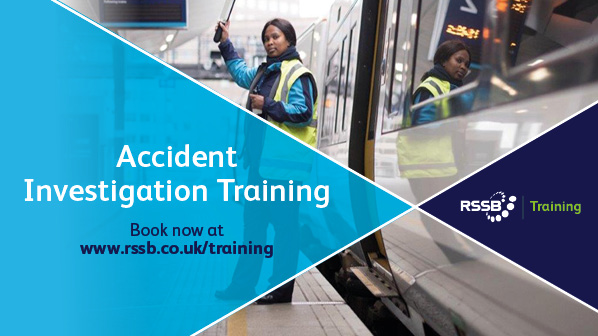RSSB’s accident investigation training is based on this, tailored to the practical needs of railway investigators.
There is often pressure to investigate accidents quickly, meaning people focus only on seemingly obvious events. However, accident investigation is a necessarily complex undertaking because of the diversity of potential factors and the myriad of ways they could have interacted. The process involves teasing apart all the different events that happened in the run-up to the accident, and then understanding the contribution that each made to the outcome. This work requires a highly complex suite of skills and investigators must complete training and practise in various tasks to a high level of proficiency to be able to perform effectively. They must also possess an understanding of how and when to use these skills effectively in a live situation.
For accident investigation trainers, this complexity equally requires robust and sophisticated expertise in multiple domains as well as an understanding of industry needs.
“RSSB’s position as an independent organisation for the benefit of the whole railway, and its expertise in developing standards that define how the railway runs, makes it uniquely well-positioned to deliver such training,” says RSSB senior rail operations specialist and course lead trainer, Barbara Smith. “The Rail Industry Standard for Accident and Incident Investigation (RIS-3119-TOM) is the basis for the training, combined with our expertise in human factors. This means that the training provides the knowledge and skills accident investigators really need, delivered in highly effective ways.”
Accident investigation trainees require specialised training and support from their whole organisation to be effective in their role. This is particularly the case given that most railway accident investigators are not full-time investigators but active staff working across the railway - from driver managers and engineers tostation staff, HR managers or safety officers.
RSSB’s accident investigation training meets the need for specialised training. It uses a mix of team exercises, real-life cases, and practise in mapping detailed timelines. This gives people practical tools to think about specific incidents in detail, as well as a broader understanding of incidents overall. The training is visual and interactive wherever possible to make it readily accessible. It can also be offered face-to-face over two days or in three virtual modules spread over a week.
As Stuart Anderson, head of safety at GB Railfreight says: “RSSB experts are key to creating and delivering specific targeted learning. With a desire to deliver internal safety improvement and support the Leading Health and Safety on Britain’s railway (LHSBR) and National Freight Safety Group (NFSG) visions and strategies, we made our choice. Our relationship with RSSB is strong and it was a no-brainer for us to choose them.”
RSSB also offers an accident awareness training for managers course. This helps managers understand the necessary skills and processes for useful investigations, finding ways to make investigations easier or identifying strong candidates for investigation training.
RSSB’s accident investigation courses have clear benefits, as Anderson points out: “We’ve seen a marked improvement in investigations completed on time, the quality of underlying cause identification is better, and recommendations are looking more deeply at system factors, which are integral to running a safer operation.”
RSSB can tailor the training so the scenarios and standards used are relevant to the organisation or team. This increases the ease, speed and effectiveness of applying the new knowledge.
“RSSB listened and understood our needs and came back with a solution that matched,” Anderson says. “The support and service were exceptional. If you want to ensure you are doing the best for your employees and your business then this is the way to go. It enables us to remain in the good books of the regulator, too.”
Learning accident investigation skills takes time. RSSB continues to provide support after the training events such as through internal forums to share experiences, accident reports, or e-learning to help assess how much knowledge has been retained. “Our focus is not just on the days of training,” Smith says. “RSSB’s purpose is to improve safety and the railway industry overall, so we provide support to people as they learn how to apply their new skills at work too.”
If you would like to schedule a complimentary consultation to find out how RSSB can help deliver bespoke training either, remotely or at a location of your choice, please contact the Training team at [email protected] or (+44) 020 3142 5418. RSSB would be happy to discuss your exact requirements and explore how to support the development of your team or company.

